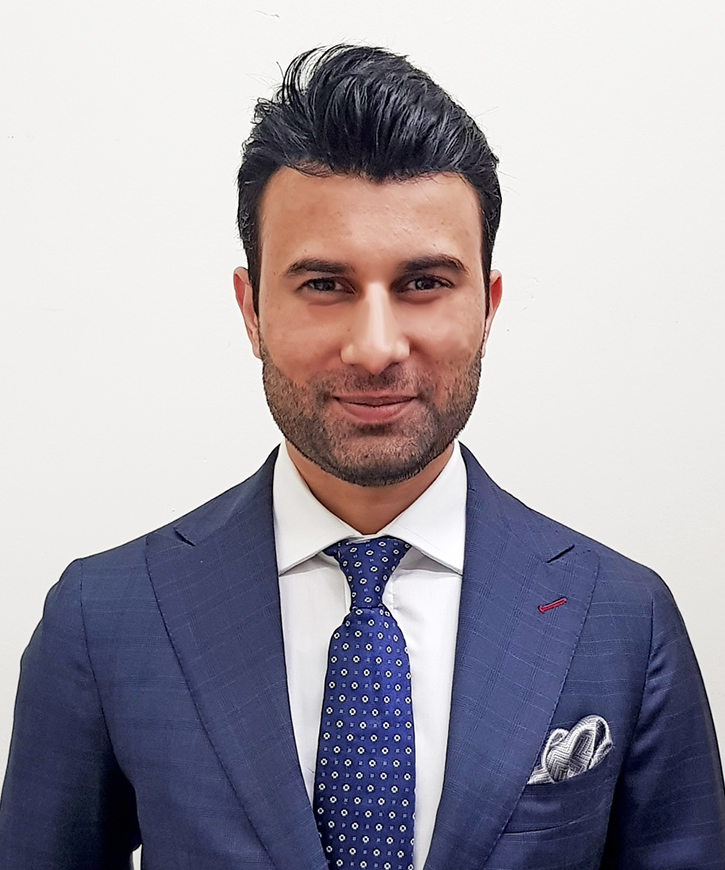
Men's Style Blog
Section: Men's Style - Blog
Does the fabric pattern of your suit matter? Well, if you don't know the answer, you'll be easy prey for unscrupulous salespersons anxious to sell you something inferior. Don't worry about making any fashion mistakes, though, because we've condensed all you need to know into 5 simple factors to help you pick the best fabric for your next men's suit. Number 4 on that list? Pattern.
Keep these five factors top of mind when suit shopping, and we guarantee you'll get top quality for your money - every time.
1. Colour
2. Composition
3. Weave
4. Pattern
5. Weight
In this article, we look into the importance of fabric Pattern.
The fabric patterns used for men's suits are created by interweaving differently coloured threads. Here's a guide to a few of the most common (and stylish) patterns found in a typical men's suit:
Solid block colours are fabrics made up of one colour tone without any inherent patterning. They are a widely accepted, popular choice for all suits including:
Solid colours are especially popular for garments to be worn on formal occasions.
Although seemingly consistent in colour tone when viewed from a distance, a crosshatch pattern offers the effect of light brush strokes (in either/both horizontal and vertical directions) when examined closely. Often seen in grey and charcoal suits, the crosshatch pattern adds a subtle sophistication to the otherwise solid block look.
This fabric features a dual-tone pattern characterised by broken checks or abstract four-pointed shapes. It is usually manufactured in black and white, although other colours are sometimes used. As an example, the Australian general department store David Jones uses a houndstooth pattern as part of its corporate logo. Houndstooths are usually chosen for casual sports jackets, rather than business suits.
Alternate diagonal lines making a distinct VVV pattern across the fabric (resembling a cartoon fish bone) is the signature mark of a herringbone fabric. The herringbone pattern is very popular and can be used for almost any type of suit or jacket.
Plaid fabrics refer to three individual fabric patterns that create interesting depth in the aesthetic of the suit:
A suit made from windowpane fabric will have both horizontal and vertical pinstripes that intersect to make larger boxes. Interestingly, a glen plaid is a tight twill pattern of broken checks while the Prince of Wales is actually a glen plaid on a windowpane scale.
These patterns are as appropriate for sports jackets as they are for the more adventurous business suit. Finer lines create larger, open squares creating an overall checkerboard effect. Depending on the boldness of the squares, this pattern could be considered either sophisticated or daring.
When regularly spaced, parallel stripes of a lighter colour are woven into the fabric, it is referred to as either pinstripe or chalk stripe fabric, depending on the thickness of the stripes. Stripes may be thick, medium or thin, and may be widely or narrowly spaced.
Pinstripes are a popular choice for all types of suits and jackets, especially for business suits. Chalk stripes are bolder, more widely spaced white stripes on a dark fabric background. Because chalk stripes make such a striking statement, they tend to be less popular (except for the daring, sartorially savvy gent.)
A self-stripe fabric resembles pinstripe, but the parallel stripe effect is achieved using a weaving technique rather than a different coloured fabric. Because of this, lines on self-stripe fabric are usually subtler in appearance than pinstripes. The self-stripe pattern is versatile and good for most occasions.
Somewhere between solids and stripes is the bird's eye or nailhead pattern. When examined closely, these patterns have the appearance of tiny dots of a lighter colour on a darker background, thus giving the appearance of an overall solid colour somewhere in between the two colours. Nail-heads are versatile and are appropriate for almost all occasions.
So, which suit fabric should you choose? If you're like most men, you'll make your choice based on your wardrobe budget and the circumstances where you'll wear your suit. As we've touched on here, suiting fabrics for an all-purpose business suit will differ from those for a formal wedding suit or tuxedo.
When you shop at Montagio Custom Tailoring, you'll have the advantage of a wide range of suiting fabrics to choose from combined with the expert knowledge of our master tailors. It's a winning combination that ensures you'll get a top quality suit at a reasonable price because we want to make sure you look damn good!
With over 20,000 satisfied clients, Montagio's distinction as the top-rated tailor in Sydney and Brisbane is no coincidence. Our success lies in our commitment to personalisation, ensuring each suit is a true reflection of the individual wearing it. Unlike others, we focus on providing unparalleled service, meticulous attention to detail, and an array of bespoke options, making every Montagio suit a testament to quality and individuality. If it lacks that personal touch, it simply isn't Montagio.
Behind every Montagio suit is a team of experts dedicated to precision, craftsmanship, and personal service. Get to know the masters who bring your vision to life, ensuring every suit is as unique as the person wearing it.

James Goodchild
With over 15 years of experience in suiting and 8 years at Montagio, James Goodchild has custom-fitted over 3,000 suits, earning a reputation as a trusted bespoke tailoring expert in every aspect of the art. Passionate about bold statement suits and meticulous craftsmanship, he believes true greatness lies in integrity, influence, and style - much like a well-tailored suit that leaves a lasting impression
Book @ Montagio
Aaron Bry
Aaron began his career in 2002 and has deep expertise in tailoring and luxury menswear, achieving multi-million-dollar sales and earning induction into MJ Bale’s Million Dollar Club... twice. Now converted to custom, he is committed to excellence in both style and service and believes in always being impeccably presented. Outside of work, he enjoys bodybuilding and films, often described as a 'gentle giant' for his approachable nature.
Book @ Montagio
Jatin V.
As Founder, Jatin sets the tone for style, innovation & individuality – uniting our artisan tailors, stylists & clients in a shared pursuit of elegance and quality. With privileged access to the world's most esteemed mills and suppliers, he ensures every collection begins with the finest foundations. Jatin leads with vision and purpose, guiding Montagio's direction with an unwavering commitment to personalisation & expression.
Book @ Montagio
Named in GQ Magazine's "Best Tailors" list, and the highest reviewed tailor on Google, Montagio has paved the way for discerning men to get suited up with style. A truly personalised experience, we deliver perfectly fitted bespoke suits, shirts and coats for business, weddings, formal and casual events. Our showrooms are packed with designs that inspire and thousands of fabrics, making it easy for you to get the look you want. Our difference? We won't let you walk out until we've tailored your perfect garment. It's personal. To experience Montagio's red-carpet service, book your personal appointment today.